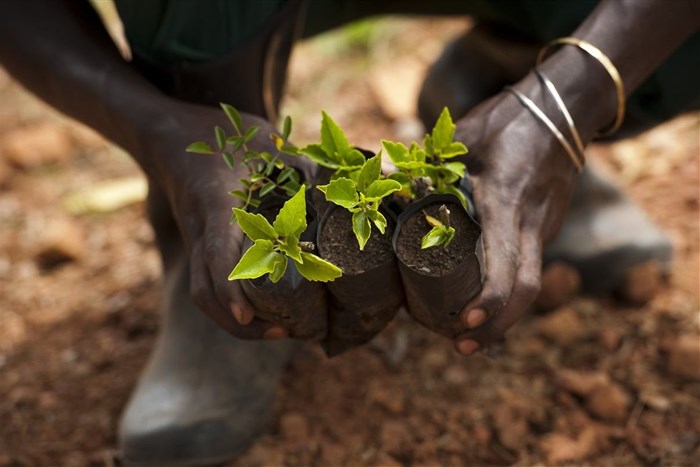A survey conducted by Savanta ComRes, which was commissioned by Vodacom, has revealed that digital tools can help farmers in Africa fight climate change, but government support is urgently needed to support the increase of these tools. Over 200 farmers across South Africa, Kenya, Tanzania and Egypt were asked how they feel about digitalising their farms, and how they are handling different threats like environmental challenges, geopolitical and societal pressures, as well as supply chain issues, which have caused a rise in equipment and materials costs.
As expected, climate change is top of the list of threats facing farmers in Africa. Nearly all farmers surveyed in Africa (93%) say climate change is affecting the financial viability of their farms. And around half of African farmers say that they have been impacted to a great extent by climate change (45%). This number rises to 62% in Tanzania and 52% in Kenya.
Other threats cited by farmers include low market prices for crops and livestock, increased operating costs and a lack of support from the public sector.
War in Ukraine impacts availability of crucial farming resources
Results also show that the war in Ukraine is having an impact; creating concern among farmers around fuel and energy costs, as well as the availability of key agricultural resources. The African markets are mostly worried about increased fuel and energy costs (52%), and the availability of fertiliser (42%). In addition, there was increased concern expressed among farmers from Egypt (51%), and South Africa (44%) about being cut off from existing markets.
How technology can help. The survey results highlight how digital technologies can help farmers manage with fewer resources and secure the future success of their operations; 89% of respondents in Africa felt this way and more than half of farmers said they were optimistic about the future of farming as an industry.
The use of digital agri tools is already widespread. The survey found that close to half of the farmers in Africa are already using digital tools to reduce water use (41%) and to improve soil health (42%). There is also clear evidence that farmers are willing to further invest in digital technology to help them combat issues like climate change. Almost all of the surveyed African farmers (94%) plan to invest more in digital tools in the next 12 months. But there are challenges.
While farmers are keen to invest in future digital technologies, adoption isn’t easy. The cost of devices and other hardware is another prominent barrier for 48% of African farmers surveyed; access to reliable mobile connectivity and the cost of applications and software are other challenges.
Sources and types of supply
With farmers expressing a clear desire to use technology to overcome the challenges presented by climate change, the question is: what support is needed to help them do so, successfully?
While most of the surveyed farmers acknowledge that they are getting some help from government already, it is not enough. Around half (55%) of surveyed farmers in Africa say their government is taking action to support them and 87% of African farmers want more government support.
However, they are not only seeking financial support. Around 54% of farmers in Africa want assistance with training to help them make better use of digital solutions, which indicates that addressing barriers to the adoption of digital technology may start with addressing the lack of confidence in using these new technologies. Connectivity is also a key ask; 36% of respondents say that better mobile internet connectivity is something their governments can do to enable them to use more digital tools and solutions on their farms.
"Our farmers are facing unprecedented challenges and they need help. It is incredibly encouraging to see that this community is already embracing digital solutions and that they understand the value these tools and technologies offer. But more must be done to ensure that African farmers fully embrace precision agriculture,” comments Shameel Joosub, CEO at Vodacom Group Limited.
"Our farmers are willing to invest in digital tools and they are keen to use these tools to transform their operations. Governments working together with the private sectors must take note of the issues they face so that they can help these farmers to mitigate the effects of climate change, use farming resources and inputs more effectively and better provide for themselves, their families and their communities."
The brand, for example, has made strides in heeding this call to action, increasing network coverage across rural areas in its markets, and making affordable handsets available to millions of Africans to date, In Tanzania, the M-Kulima mobile platform connects smallholder farmers to a wealth of information and resources via short message service (SMS), unstructured supplementary service data (USSD), and interactive voice response (IVR).
M-Kulima provides timely weather forecasts that help farmers plan around climate change and offers important market information to help farmers get the best price for their products. M-Kulima is also integrated with the financial-services platform M-Pesa, to nurture financial inclusion by providing a mobile-phone-based money transfer service and enabling payments and micro-financing.
Meanwhile, in Kenya, the end-to-end DigiFarm platform – available via USSD or via the app – provides everything from basic farming advice to more advanced and mechanised support, much in the same way that M-Kulima does.
Methodology
The survey was conducted online in Europe and by telephone in Africa by Savanta Comres in 13 countries: Germany, Greece, Hungary, Italy, Netherlands, Portugal, Romania, Spain, and Turkey, for Europe; Egypt, Kenya, South Africa, and Tanzania, for Africa.
Fifty farmers were surveyed in each market, except in Romania, where 21 were surveyed. Respondents were from a cross-section of farm sizes.
Fieldwork took place in September and October 2022.




































